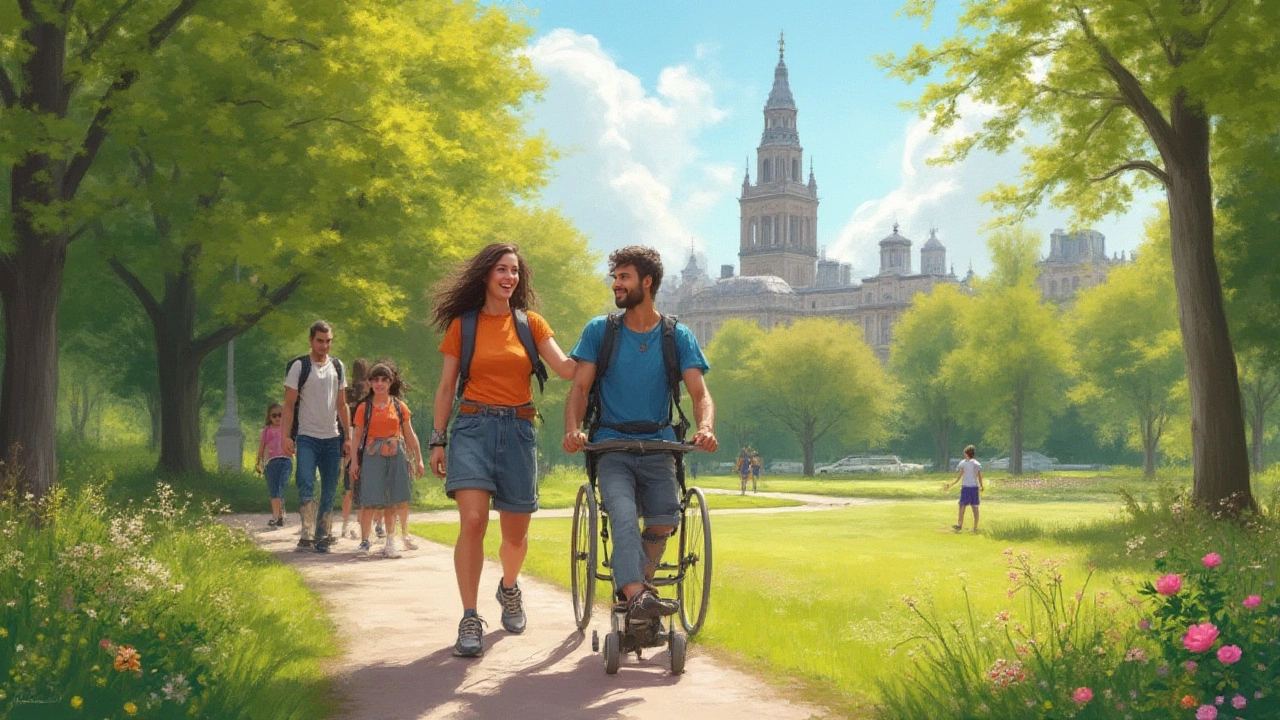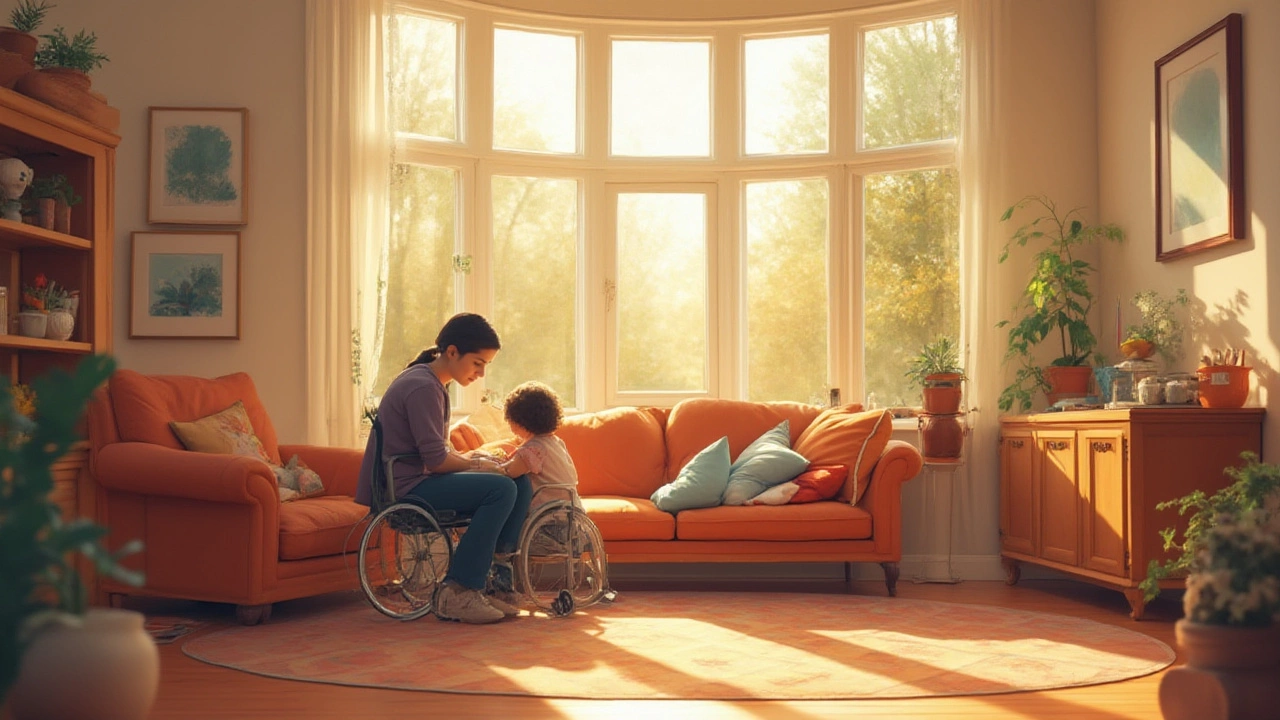Imagine watching a toddler discover the world for the first time. She sees a dog, and her mind labels every furry animal "dog"—until she meets a cat. Suddenly her world cracks open: not everything with four legs and fur is a dog. This mental shift is called accommodation—when we change the way we think to make room for new experiences. No matter if you’re a parent watching your child learn, a student tackling unfamiliar ideas, or just navigating daily life, you bump into accommodation more often than you might think. And honestly, the way the brain pulls this off is way more fascinating than we give it credit for.
Understanding Accommodation: The Basics and Beyond
Accommodation, in the world of psychology, isn’t about booking hotel rooms. It’s a core piece of how our brains learn and adapt. The term comes from Jean Piaget, a Swiss psychologist famous for studying how kids build up knowledge. Piaget broke learning down into two basic processes: assimilation and accommodation. Assimilation is like squeezing new info into the boxes you already use; accommodation is about building brand new boxes when the old ones don’t fit. The brain uses accommodation when it can’t just slightly tweak what it already knows—sometimes, you have to scrap your idea entirely and start over.
Let’s break this down. Go back to my daughter Orla, who once thought every flying insect was a bee. When she got stung for the first time, she didn’t just tweak her idea of what bees do—she realized not all flying bugs are bees. She split off wasps, butterflies, and moths into separate categories. That's textbook accommodation. This isn't just a kid thing, either. Adults do it when they switch careers and have to unlearn office habits for a new work culture. Accommodation is about shaking up the mental furniture, and it’s the unsung hero that keeps your brain flexible as life brings surprises.
Here’s a neat fact: in the mid-20th century, Piaget observed thousands of children and saw that accommodation played a starring role during certain "stages" of learning. For little kids, it pops up when they realize rules aren’t always black and white. In teens, accommodation kicks in as they learn the world isn’t as simple as it looked in elementary school. Adults, surprisingly, accommodate too—try explaining TikTok to someone who came of age with landlines and dial-up internet. If you’ve ever tried to help your parents with phone settings, you know what I mean.
Modern researchers back this up. According to a 2022 review in the journal "Developmental Science," people who lean into accommodation handle change much better—and are more creative—than those who stick too hard to routines. So, it’s more than just a cute kid thing; it’s how you grow, solve real problems, and stay mentally young.
Real-World Examples of Accommodation (With a Twist)
That sounds nice in theory, but what does it look like in messy, real life? Here are some everyday examples that bring the concept down to earth.
- Childhood learning: A preschooler calls every animal with four legs a "dog." Seeing a cat, her parents explain the difference. Her brain changes course—accommodation at work.
- Language learning: Ever tried to learn Spanish rules after years of English? Your mind has to rewire itself, especially for stuff like gendered nouns (el, la), which don’t exist in English. It’s not tweaking what you know; it’s making new neural pathways.
- Social situations: Growing up, maybe you thought "everyone is nice if you’re nice." Until someone takes advantage of your kindness. You realize you need a new rule about trust. That’s accommodation in a nutshell.
- Medical diagnoses: Someone learns they’re diabetic and must rethink not only their diet but also their sense of self—"I’m not invincible." They create a new category for their health and life choices.
- Technology: Ever witness someone from an older generation try VR for the first time? Their jaws drop. Instead of just fitting VR into their current idea of "video games," they form a new category: immersive digital worlds.
- Parenting: I’ll admit, I thought I’d be a calm dad. Then Orla colored on the walls, and I realized that "calm parenting" sometimes means rolling up your sleeves and scrubbing, not giving a dramatic speech. Sometimes the only way through is adapting fast.
Here’s why these examples matter: accommodation isn’t always a comfortable process. Sometimes, it feels like you’re losing your grip on what you thought you knew. But according to a 2019 Stanford University experiment, people who embrace the discomfort of relearning actually end up more resilient. That’s some science-backed encouragement for those messy parenting moments when nothing makes sense anymore.
Below is a table with stats that show just how often people encounter these learning challenges in real life:
| Age Group | Common Accommodation Scenario | % Reporting Major Life Adjustments/Year |
|---|---|---|
| Preschoolers (3-5) | Animal categories | 78% |
| School-age (6-12) | Rules & fairness | 65% |
| Teens (13-19) | Abstract ideas | 72% |
| Adults (20+) | Career or social shifts | 59% |
Turns out, no one’s immune from having to shake up their worldview.

Accommodation in the Classroom: Learning Gets Real
Teachers see accommodation in action every day. If you watch a class where a math teacher introduces fractions to second graders, you’ll spot the wheels turning. Kids who blend new knowledge with what they know (like calling a half "one-two") are using assimilation. But once the penny drops—"Oh, a half isn’t always about dividing food, but can be any quantity split evenly."—that’s accommodation.
Lots of schools use techniques to nudge this mental gearshift along. One trick is presenting students with puzzles or problems that don’t fit their go-to solutions, basically forcing them to rethink the problem. For example, science teachers who challenge kids with "Is air really matter if we can’t see it?" push students to drop black-and-white categories. It’s a gentle way to encourage flexible thinking.
Special education circles talk about a different kind of accommodation—changing how kids access the curriculum to meet unique needs (like giving extra time on tests). But in Piaget’s sense, it’s all about the mental leap: switching up the internal rules so new info makes sense. It’s why learning isn’t always a smooth climb—sometimes it’s a jarring leap forward.
Here’s a cool teaching tip: posing "what if?" questions helps students bump into the limits of their current ideas. When they run into something their old thinking can’t explain, they have to come up with a better mental model. Also, giving students chances to talk through their confusion in groups helps because it normalizes not having all the answers. That space lets kids take the risk of rewriting their mental playbook without embarrassment.
If you’re a parent, you can help your child with accommodation, too. After Orla started school, I’d ask her to explain her thought process, especially if her answer was wildly off base. Turns out, she didn’t just guess—her brain was building categories, and sometimes she needed a nudge in the right direction. When kids get stuck, they often just need a gentle question, not a lecture, to see things differently. That goes for adults, too, honestly.
Why Accommodation Is Tough (And How To Get Better At It)
So, if accommodation is so great, why do people stubbornly stick to old ideas? The truth: changing your mind is hard work. Your brain prefers comfort and routine. Shifting mental gears costs effort, and sometimes it even feels like swallowing pride—admitting your old ideas don’t fit anymore.
This isn’t just a feeling. Researchers at Princeton University ran an fMRI study in 2018 and found that when people face information that challenges their beliefs, the parts of the brain linked to discomfort and pain light up. So next time you’re frustrated because someone just "won’t change their mind," remember: their brain might literally be resisting discomfort.
All hope isn’t lost, though. Practicing some mental flexibility actually gets easier the more you do it, like stretching before running. Psychologists call this "cognitive elasticity." Try these tips if you want to flex your own accommodation skills:
- Embrace confusion. Staring at something you don’t get is a sign your brain is about to grow—if you push through.
- Ask “why?” and “what if?” questions when you hit a mental block. Imagine alternative explanations, even silly ones.
- Seek out new experiences on purpose. The more often you get thrown curveballs, the less intimidated your brain gets.
- Talk to people who disagree with you. Genuinely listening to other viewpoints is a shortcut to new mindsets.
- Model flexibility for your kids or coworkers. Admitting "I was wrong" teaches everyone that changing your mind is a superpower, not a weakness.
I try to keep this top of mind with Orla. If I get something wrong—directions, a recipe, a rule—I let her see me course-correct. The message I want her to get is: Don’t dig in your heels when new facts come up. Get curious, shrug off embarrassment, and see what happens if you switch tracks.
One last tip: take your time. According to a 2021 meta-study in the "Journal of Learning Sciences," accommodation happens best when people have chances to reflect—not when they’re rushed or pressured. Building a new mental framework requires patience and a little self-kindness, whether you’re six or sixty.

Making Space for Accommodation in Your Life
Accommodation is less like rearranging knickknacks on a shelf and more like knocking down a wall to build a bigger room. It’s disorienting at first, but the payoff is more mental space to grow, adapt, and connect.
Whether you’re watching a child learn to ride a bike, switching careers, or just trying out a new recipe after years of making the same dish, you’re using accommodation. The next time you stumble onto something baffling, pause and notice your old mental rules and the urge to cling to them. If you stick with it—push through the urge to give up—you’ll come through smarter, savvier, and way more adaptable. Your brain, like any muscle, gets stronger with practice. And that’s something nobody outgrows.


Corbin Fairweather
I am an expert in real estate focusing on property sales and rentals. I enjoy writing about the latest trends in the real estate market and sharing insights on how to make successful property investments. My passion lies in helping clients find their dream homes and navigating the complexities of real estate transactions. In my free time, I enjoy hiking and capturing the beauty of landscapes through photography.
view all postsWrite a comment